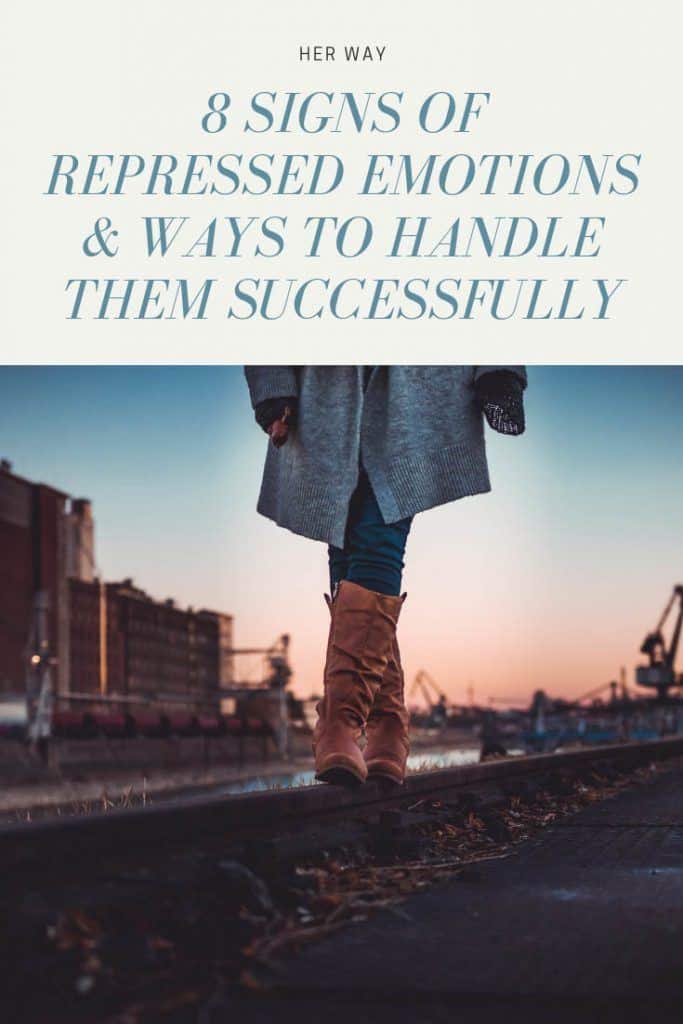8 Signs Of Repressed Emotions & Ways To Handle Them Successfully
What are repressed emotions?
When you are an emotionally repressed person, you are probably not aware of that fact.
But the truth is that this is a medical condition in which you find it almost impossible to express your feelings, especially when you are uncomfortable.
It’s not just that you hide your emotions—you are consciously trying to avoid them and run away from them because you don’t know how to handle them properly. But these feelings don’t disappear in the process.
Instead, they bottle up inside of you and usually cause you numerous problems, which you don’t even see.
If everything you’ve just read applies to your personality, congratulations because you’ve taken the first step by coming to the right place.
And you know why? Because you are about to read most of the symptoms almost every emotionally repressed person faces, which will help you diagnose yourself.
And that is not even the best part because you are also getting 10 successful ways to deal with your condition.
What are the signs & symptoms of repressed emotions?
1. You don’t listen to yourself

When was the last time you really paid attention to yourself? The last time you really followed your heart and the last time you had some one-on-one talk? I bet you can’t remember.
Well, let me tell you that one of the first signs that you are emotionally repressed is the fact that you are not in touch with yourself.
You don’t carry out any self-introspection and you aren’t listening to your inner voice and subconscious side.
Even when you notice that there is something going on and that you are feeling bad, you don’t research the cause of this emotional energy you’ve been feeling.
Instead, you choose to ignore it, thinking that it’ll magically disappear that way.
2. You are embarrassed by anger and sadness

If you are a man, when you were a kid, you were taught that boys don’t cry.
You were taught that real men are rarely sad and that they always deal with life by standing firmly on their own two feet.
You were taught that showing your weaknesses and vulnerable sides is not a manly thing and with time, you’ve adopted this pattern of behavior.
On the other hand, if you are a woman, you were probably taught that girls should never lose their temper.
You were told that you weren’t behaving like a real woman every time you showed your anger or nervousness.
And even though you might not be aware of this, these views shaped you to be the person you are today.
When you were a little child, you were taught that anger and sadness are negative emotions and now as an adult, you are ashamed of them.
Well, let me tell you one thing—there is no such thing as bad and good emotions.
Whatever you are feeling, you are entitled to feel and you shouldn’t justify yourself for experiencing a certain emotion.
3. You never talk about your emotions

Another important symptom of emotional repression is the fact that you don’t share your emotions with anyone.
Don’t get me wrong—I am not saying that you should go around and talk about your deepest fears, hopes, aspirations and darkest secrets to everyone who comes your way.
But the truth is that you surely have a few close friends and family members.
Nevertheless, you don’t talk to them about your true feelings either.
Even when you cry, you never do it in front of them. Instead, you prefer dealing with all of your stuff on your own, without involving anyone else.
Have you ever thought why this is so? Are you ashamed to feel? Do you think people around you will ridicule your feelings?
Do you trust them? Or do you think that they might use you opening up to them against you?
4. You are guarded

Have people called you guarded in the past? But I am not talking here about the fact that one person told you this.
I am talking about the fact that you are known to be a closed and guarded person and that almost everyone thinks this way about you.
Don’t get me wrong—I am not saying that this is a bad characteristic of yours because it is simply a part of your personality.
I am not telling you to wear your heart on your sleeve at all times. But the truth is that this quality of yours has to have some kind of background and a reason.
I know that you are probably trying to protect your heart from getting broken and that you are overly careful with people but the fact is that you’ve built these walls around yourself and that you don’t let almost anyone in.
You might not be aware of this but the truth is that you often appear as if you are wearing steel armor that cannot be shattered.
And this is also one of the first signs of an emotionally repressed person.
5. You are always ‘all right’

One of the main characteristics of emotionally repressed people is the fact that they will never say out loud when something is bothering them.
Instead, when people ask you how you’ve been or if you need some help, you’ll always answer that you are all right and that you don’t need anything.
But let’s face it—we all have good and less good days. We all have days when we are anything but all right.
Nevertheless, you prefer ending a conversation about your feelings by assuring everyone you are OK instead of giving them a chance to dig through your emotions.
But have you ever asked yourself if you are lying to everyone around yourself by doing this? Or that you are lying to yourself as well?
Are you trying to convince yourself that there is nothing to be worried about and that you are perfectly fine, even when deep down you know you are not?
I am pretty sure that the answer is yes and that is a clear indicator of you repressing your real feelings.
6. You hold grudges

When you hold back your emotions, you have a habit of holding grudges for a long time, even over small things.
The truth is that you don’t process when someone close to you does you harm or hurts you because you are certain that the feeling of disappointment or repressed anger will go away with time, if you choose to ignore it.
And this approach only works in the short-term because your feelings actually keep piling up and you end up acting overly resentful.
You don’t forgive people in time because of your inability to face what happened in your relationship with someone and that brings you more bad than good.
Even if you are not aware of it, the truth is that with time, you became a prisoner of these feelings and the only person you are causing harm is yourself.
Remember, forgiveness brings liberation and it’s better to do it in time.
7. You’ve been accused of being passive-aggressive

Have people always been accusing you of being passive-aggressive? If the answer is yes, there is a possibility that your potentially passive-aggressive behavior is a consequence of your repressed emotions.
It is more than obvious that you don’t have the ability to face your problems in time.
You have a hard time telling people what is bothering you at the exact moment when you feel bad and you don’t know how to argue productively.
But everything you are feeling is kept somewhere deep inside of you and it doesn’t magically go away if you act like it isn’t there.
So, sometimes, you unconsciously punish the ones you love by ignoring them or giving them the silent treatment, when they do something that bothers you.
8. You blow up over small things

Another sign that you are bottling your emotions up is the fact that you have a habit of blowing up over small things.
If you come to think about it, none of your fights with your loved ones are about huge things that are actually important to you.
Instead, you suppress your real emotions and you don’t show them in time and then you just lose it over the smallest possible thing.
And of course, everyone thinks that you are overreacting and exaggerating when you make a fuss about something that nobody else would.
This is especially surprising coming from you, since you are known to be someone who doesn’t have a tendency to react to bigger things, let alone to blow them out of proportion.
But what people don’t know is that your reactions always have a deeper background.
And to be honest, they can’t know it either. Nobody can read your mind and nobody can magically know when you are bothered by something unless you verbalize it.
You can’t expect the people close to you to understand that you are attacking them now for something they did last month.
What are the best ways to deal with repressed emotions?
1. Be aware that you have a problem

The first step to resolving every problem, including this one, is accepting that the problem is real and that it exists. There is nothing shameful in being an emotionally repressed person.
Yes, it is a part of who you are but it also brings you many troubles in connection to others and especially in the relationship you have with yourself.
So the first thing you ought to do is look at the truth in the eye and admit to yourself that sometimes you hold back your emotions.
And even more so that this is causing you more trouble than you are aware of.
2. Remember that you are only human

After you’ve acknowledged that the problem exists, it’s time to start working on finding ways to resolve it.
And the first step in doing this is accepting that you are only a human being, made of flesh and bone.
Remember—none of us is perfect and nobody expects you to be flawless, even though you should never think about your feelings as your imperfections.
You are not some superhuman and you are more than allowed to have a bad day or to feel lousy, even without some special reason.
Nobody will make fun of you for showing your vulnerable side and the people who deserve a place in your life will never use your weaknesses against you.
You deserve to have someone who can be your shoulder to cry on and someone to hear you out when you need it.
3. Find some ‘you’ time

But let’s face it—you can’t share your feelings with the people close to you unless you become aware of them for yourself first. So, what you need to do is acknowledge your emotions.
Your feelings are existent, they are real and they aren’t going anywhere, as much as you try to chase them away.
So instead of allowing them to pile up and instead of trying to run away from them, without any success, the only option you have is to look them in the eye and try to deal with them the best way possible.
And the best way to do so is to find some ‘you’ time. I know you live a busy life but remember—this is important for your physical and mental health so try your best to find some time to be alone with your thoughts.
I won’t lie to you—this can be scary sometimes. So take a few deep breaths because you are about to face all of your inner demons and to be honest, you are even not sure what awaits you in the depths of your own personality. But it has to be done.
And when I am talking about ‘you’ time, I am not saying that you should sleep, watch TV, read a book or listen to music.
The key is in shutting out everything and everyone that might catch your attention and that might drive your focus away from listening to yourself.
Once you find that time, listen carefully to your inner voice. What is it telling you? What are the things that are hurting you the most? What is it that makes you happy?
What are your fears? What are your craziest dreams and hopes which you don’t have the courage to say out loud?
Give yourself answers to each one of these questions and don’t rush it.
Think about these things thoroughly because this is everything you’ve been running away from for as long as you can remember.
4. Learn to cry

I know you think that the biggest sign of your bravery is the fact that you never cry, not in front of others and not even when you are alone and that you are almost never truly sad.
You never break apart and even when you feel like you could cry, you toughen up and you don’t allow your tears to come to the surface.
But that doesn’t mean you are courageous. I am sorry to be the one to break it to you but this only means you are not brave enough to face your emotions, even when you don’t like them. Instead, you choose to cowardly run away from them.
Because let’s face it—sometimes, you deal with things that should make every human being sad.
And do you think all of your suppressed tears go away? No, they don’t disappear. They remain bottled up inside of you.
And that is exactly why it’s time for you to learn how to cry. Even when you don’t feel like crying, because you probably forgot how to do it, make yourself cry.
Think about a sad memory and let it consume you completely. Listen to a pathetic song that reminds you of someone you’ve lost. Force yourself to cry your heart out one way or another.
Just do it. And when you start, don’t hold yourself back. Scream, if you feel like screaming.
Sob and let all those tears out. No, you are not pathetic and you are not a crybaby—you are just a human being.
5. Learn to laugh

When you hold your emotions inside of you, you can’t choose which of them to repress and which of them to let out.
So consequently, you forget to be happy as well, because you try so hard not to show any feelings.
Therefore, the next thing you should learn to do is laugh without any specific reason.
Think about something you know will put a huge smile on your face. Trust me—it will make you feel much better.
6. Don’t ignore your emotions

Once you start facing your emotions, the worst thing you can do is be scared of them and start ignoring them all over again.
Instead, accept your feelings as a part of who you are and don’t ever shut them down.
When you feel like an emotional wreck, allow yourself to cry. When you are angry, allow yourself to be angry, without endangering yourself or anyone around you. And when you are happy, just be happy.
Don’t compare your feelings to those of others. Don’t think about if you should be feeling something or if your emotions at any given moments are appropriate. Don’t think about fitting into a box or acting socially appropriate.
Just be your true self whenever you feel like it. Remember—nobody will judge you for it.
And even if they do, it only means that they don’t deserve a place in your life.
7. Don’t judge yourself

Once you stop caring about other people’s opinions and judgments, it’s time for you to stop judging yourself.
Forget about everything you were taught as a child and stop considering yourself too weak for feeling.
Instead, it’s time for you to be proud of your own strength and for the fact that you’ve gotten this far.
After all, you’ve finally looked all of your inner demons straight in the eye and you are ready to accept them or to fight them off.
Either way, you’ve finally come to the stage in which you are willing to deal with your emotions, whether you like it or not.
8. Spoil yourself

The next step in handling your repressed emotions is to start pampering yourself.
I am not saying that you should become selfish overnight because this is never the way.
I am just advising you not to be so harsh on yourself. Never treat yourself worse than you treat others!
Remember how you observe your loved ones and how you’ve learned to recognize their emotions, even when they aren’t expressing them?
You know how you are ready to do whatever it takes to put a smile back on someone’s face when you see they are feeling low?
So, why exactly aren’t you treating yourself the same way? After all, you are the person you should love the most in this world and the person you should treat with the most care.
9. Find a trusting friend

Another thing that might help you in dealing with your repressed feelings in the long-term is finding a person you can trust no matter what.
I am sure that you have that special someone in your surroundings and you’d see it as well, if you had just been paying attention.
This person can be your other half, a family member or your bestie—it is just important for them to be your friend, in the real sense of that word.
Even though you are the one who has to handle your own emotions, the truth is that we are social beings and it is always easier to share our troubles with someone who is willing to hear us out.
Don’t be ashamed of sharing your feelings with this special someone because it will make you feel better and it will serve as valuable practice for further verbalizing and expressing your emotions
10. Be grateful

Finally, please be grateful for having all of these feelings. Be grateful that you’ve managed to find them and for being strong enough to confront them the right way because this is the only path to complete emotional freedom.
Don’t think of any experience or emotion as negative. Instead, look at them as valuable lessons which shaped you in becoming the person you are today.








